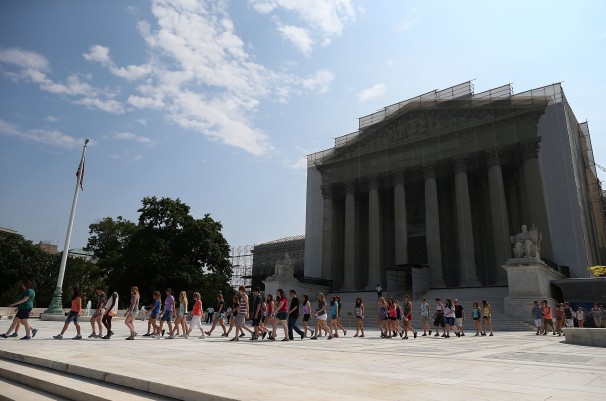Supreme Court says states may not add citizenship proof for voter registration

Mark Wilson/Getty Images
By ,
States may not require additional proof of citizenship on federal forms designed to streamline voter-registration procedures, the Supreme Court ruled Monday.
The court rejected a requirement passed by Arizona voters in 2004 that potential voters supply proof of eligibility beyond an applicant’s oath on the federal form that he or she is a citizen.
The court ruled 7 to 2 that the National Voter Registration Act of 1993 trumps Arizona’s Proposition 200.
The federal law “precludes Arizona from requiring a federal form applicant to submit information beyond that required by the form itself,” Justice Antonin Scalia wrote for the majority.
Three other states have similar proof-of-citizenship laws, and others have considered the additional requirement.
Justices Clarence Thomas and Samuel A. Alito Jr. wrote separate dissents, although both made the point that the majority ignored the Constitution’s demand that states set the requirements for voter registration.
“I would construe the law as only requiring Arizona to accept and use the form as part of its voter registration process, leaving the state free to request whatever additional information it determines is necessary to ensure that voters meet the qualifications it has the constitutional authority to establish,” Thomas wrote.
The Arizona proposition was immediately challenged after passage. A three-judge panel of the U.S. Court of Appeals for the 9th Circuit — which included retired justice Sandra Day O’Connor, sitting by designation — also held that federal law precluded Arizona’s action.
O’Connor was sitting in the courtroom Monday as her former colleagues upheld the decision.
Scalia noted that the Constitution’s elections clause, which empowers Congress to preempt state regulations governing the “times, places and manner” of holding congressional elections, gives weight to the federal regulation that states “accept and use” the federal form to enroll voters.
The state-by-state battle over who is eligible to vote, what kind of identification or proof may be required and even the hours of voting prompted a host of legal battles leading up to the 2012 elections. In general, Republicans proposed new restrictions as necessary to combat voter fraud, while Democrats said such moves would harm minorities and the poor, who often do not have easy access to the required credentials.
The court’s oral arguments and its decision avoided those partisan battles and concentrated on questions of federalism.
But interest groups that challenged the law claimed a great victory.
“Today’s decision sends a strong message that states cannot block their citizens from registering to vote by superimposing burdensome paperwork requirements on top of federal law,” said Nina Perales, vice president of litigation for the Mexican American Legal Defense and Educational Fund.
“The Supreme Court has affirmed that all U.S. citizens have the right to register to vote using the national postcard, regardless of the state in which they live.”
Groups that supported Arizona called the decision dire.
“The integrity of our nation’s elections suffered a blow today from the Supreme Court,” said Tom Fitton, president of the conservative legal group Judicial Watch. “This issue takes on increasing urgency with the prospect of 11 million illegal immigrants being given amnesty. It is essential that our elections be secured by ensuring that only citizens register to vote.”
Scalia, writing for Chief Justice John G. Roberts Jr. and Justices Anthony M. Kennedy, Ruth Bader Ginsburg, Stephen G. Breyer, Sonia Sotomayor and Elena Kagan, said Arizona is not powerless to protect against noncitizens voting.
He said the state need not register voters when it has other proof that they are not citizens. He also said the state could petition the federal Election Assistance Commission to alter the form to require evidence of citizenship, and go to court if the commission fails to do so.
Alito in dissent pointed out “that prospect does little to assuage constitutional concerns.”
“The EAC currently has no members, and there is no reason to believe that it will be restored to life in the near future. If that situation persists, Arizona’s ability to obtain a judicial resolution of its constitutional claim is problematic.”
The case is Arizona v. Inter Tribal Council of Arizona.
http://www.washingtonpost.com/politics/supreme-court-says-states-may-not-add-citizenship-proof-for-voting/2013/06/17/734a1aca-d760-11e2-a9f2-42ee3912ae0e_story.html